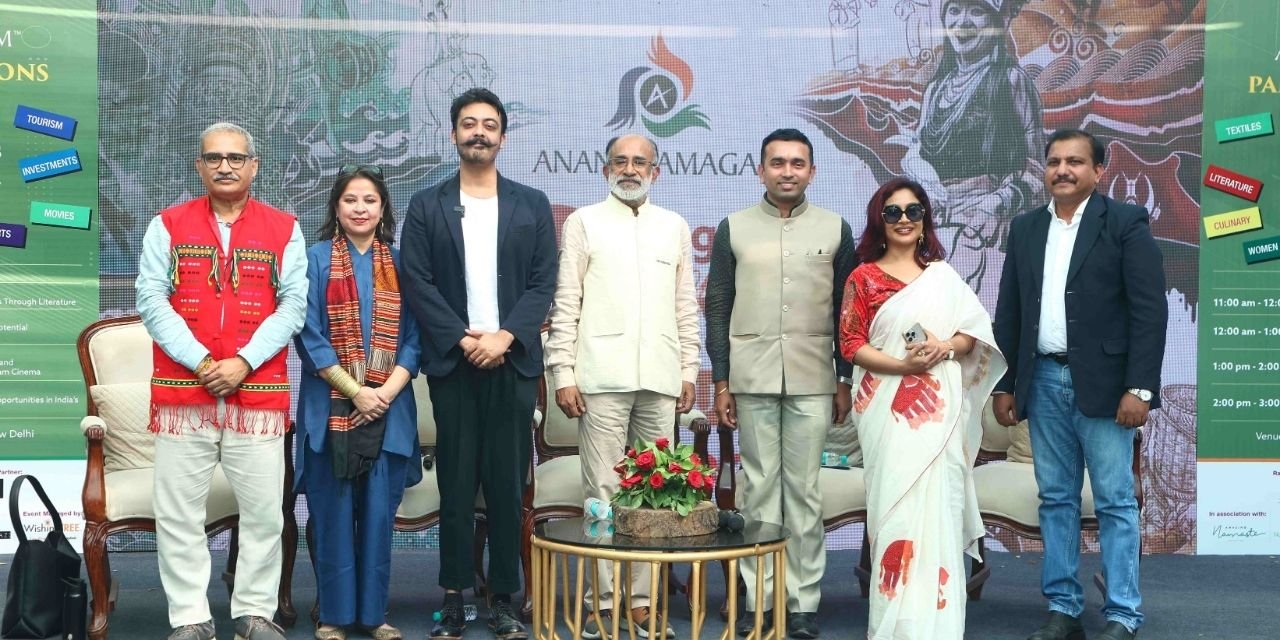With an immersive celebration of the vibrant cultures of Northeast India and Kerala, the Aalekh Foundation’s unique two-day cultural festival, Anant Samagam, came to a successful conclusion at Delhi’s Travancore Palace. In a vibrant display, the event captured the spirit of both areas. Highlighting the art, music, and culinary diversity of these two unique yet complementary landscapes, the event, organized in collaboration with the Amazing Namaste Foundation, aims to promote understanding and celebrate the vibrant cultural exchange between these geographically separated but culturally connected regions as it marks the start of the Diwali season in Delhi NCR.
Anant Samagam is a highly special celebration of cultural convergence that features a number of galleries, including an exhibition of handicrafts with weavers from the Northeast and Kerala, artifacts and handicrafts, live pottery making, etc. In addition to cooking talks and demonstrations, there are food courts with cuisines and specialties from both regions.
Dr. Rennie Joyy, the founder and managing director of the Aalekh Foundation, made the following statement regarding the mission of Anant Samagam: “With Anant Samagam, our vision goes beyond celebration to the fostering of connections between Northeast India and Kerala, two regions with shared cultural legacies.” Communities are encouraged to rediscover the common history and inventive spirit that characterize our country through this platform. We are honoring the past and encouraging the next generation to value and preserve this amazing cultural diversity by presenting these art forms, customs, and innovations.
“Echoes of Tradition: The Rhythm of India’s Performing Arts,” “Woven Stories: Heritage & Innovation in Indian Textiles,” “Empower Her: Redefining Women’s Roles in India’s Growth Story,” “Bamboo Shoots to Cardamom Routes: Culinary Connections between Northeast and Kerala,” “Building Tomorrow: Investment Opportunities in India’s Cultural Economy,” “Cinematic Confluence: Malayalam and Northeast Films Shaping Mainstream Cinema,” “Discovering India: Unlocking the Potential of Cultural Tourism,” “Words that Bind: Weaving Cultures Through Literature,” and “Echoes of Tradition: The Rhythm of India’s Performing Arts” were among the festival’s insightful panel discussions. Experts from a range of disciplines discussed how these traditions have affected modern-day India on a cultural and economic level.
The K-pop sensation Aoora gave an entertaining show at the remarkable cultural convergence. Aoora’s performance is the brightest gem of this lively festival, both because of his enduring ties to Indian culture and because of his captivating K-Pop charm. Aoora sang in both Assamese and Malayalam at the event, which was a first for any international performer and demonstrated his versatility as a symbol of intercultural harmony.
Rudy and the Kool Kats, The Musical Tribal Warriors, and the legendary Malayalam rock band Avial, who are recognized for their alternative sound, were the main acts of the event’s thrilling rock concert. Their music touched the hearts of the audience.
In the culinary segment, Master Chef India judge Rakesh Raghunathan gave an enlightening demonstration titled “Sacred Offerings: Poetry and Culinary History from Temple Kitchens,” in which attendees were given a taste of Kerala’s culinary heritage through the pairing of traditional recipes with tales from temple customs.
The exhibition “CINE-SYMPHONY Cinemas from the Northeast and Kerala” by Anant Samagam also honors the diversity of Indian cinema and how it influences mainstream filmmaking. The rich cinematic exchanges between mainstream Hindi cinema, Malayalam cinema, and Northeast cinema are showcased in the exhibition.
Led fashion directors Liza Varma and Sonam Dubal, together with other well-known fashion designers Daniel Syiem, Sreejith Jeevan, Tara Bhuyan, Shalini James, Bambi Kevichusa, Jahnabi Phookan, and Aratrik Dev Varman, organized a fashion show in the evening to wrap up the two days. By combining traditional materials with contemporary cuts, each designer showcased the elegance and classic appeal of textiles from the Northeast and Kerala.
The Indira Gandhi National Centre for the Arts (IGNCA), the Handloom Department of the Ministry of Textiles, the Kerala Government’s Ministry of Culture, Kerala Tourism, and the tourism departments of Nagaland and Meghalaya have all shown significant support for the festival, which is supported by both the public and private sectors. Their combined backing highlights Anant Samagam’s ability to raise awareness of India’s traditional craftsmen, weavers, and entertainers, whose abilities and crafts contribute to the country’s cultural character.
One excellent example of a cultural showcase, concert, and conversation is Anant Samagam, which provides a forum for participants to interact with India’s vibrant cultural story.

